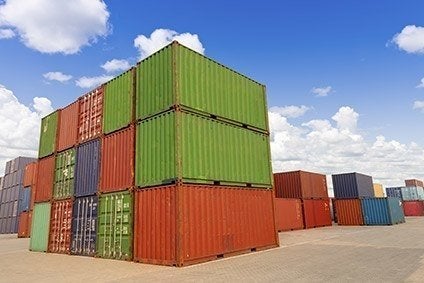
Food makers are facing the fallout of an ongoing labour dispute that closed ports along the West Coast of the US this weekend.
A nine-month contract dispute between the Pacific Maritime Association, representing the companies that own the docks, and the International Longshore and Warehouse Union, representing the dockworkers, appears to be growing increasingly bitter. Each side is accusing the other of engineering a three-month cargo slowdown to gain the upper hand in negotiations.

Discover B2B Marketing That Performs
Combine business intelligence and editorial excellence to reach engaged professionals across 36 leading media platforms.
The contract negotiations cover around 20,000 workers at around 30 West Coast ports, including Seattle, Tacoma, Oakland, Los Angeles and Long Beach.
Speaking ahead of the shut-down, the PMA member companies said they were no longer willing to pay a “premium” for “diminished productivity”. A spokesperson said: “After three months of union slowdowns, it makes no sense to pay extra for less work, especially if there is no end in sight to the union’s actions which needlessly brought West Coast ports to the brink of gridlock.”
The union’s reaction was equally heated. ILWU president Robert McEllrath stated: “PMA is leaving ships at sea and claiming there’s no space on the docks, but there are acres of asphalt just waiting for the containers on those ships, and hundreds of longshore workers ready to unload them. The employers are deliberately worsening the existing congestion crisis to gain the upper hand at the bargaining table.”
The National Retail Federation has estimated full port closures – a growing possibility – would cost the US economy as much as US$2bn a day.

US Tariffs are shifting - will you react or anticipate?
Don’t let policy changes catch you off guard. Stay proactive with real-time data and expert analysis.
By GlobalData“The continuing slowdowns and increasing congestion at West Coast ports are bringing the fears of a port shutdown closer to a reality,” Jonathan Gold, vice president of supply chain and customs policy at the NRF, said. “Enough is enough. The escalating rhetoric, the threats, the duelling press releases and the inability to find common ground between the two sides are simply driving up the cost of products, jeopardising American jobs and threatening the long term viability of businesses large and small.”
Donnie Smith, the CEO of US meat giant Tyson Foods, noted two weeks ago the problems at port were causing those operating in the meat industry logistical problems and “starting to back up a little bit in meat”.
Speaking after Tyson reported its first-quarter results on 30 January, Smith said the difficulty in shipping products was starting to result in cuts of beef being diverted into mice processing. “We’re starting to see some cuts like plates and that type of thing going into grinding meat. We’re not there yet but we’re starting to see ground beef products has dropped a little bit,” he told analysts during a call.
“If you look at chicken, we are starting to see softness in jumbo leg quarters. China has banned now because they have problems on the West Coast. We have had [problems] in Europe. Russia is not taking any US leg quarters. And so there has been a repositioning of leg-quarter movement.”
Tyson does not expect the issue to hit margins because of the “spread” of its business. The group is diverting leg quarters into boneless dark meat, a category Smith said is growing in both foodservice and retail.
Elsewhere, produce and other perishable agricultural items have been hit by the disruption at the ports, the Western Growers Association claimed.
“Ongoing contract disputes between the sides have resulted in severe bottlenecks for both importers and exporters,” the industry association said. “Several Western Growers members have been affected by the work slowdowns, jeopardising deliveries of fresh produce and other commodities.”





